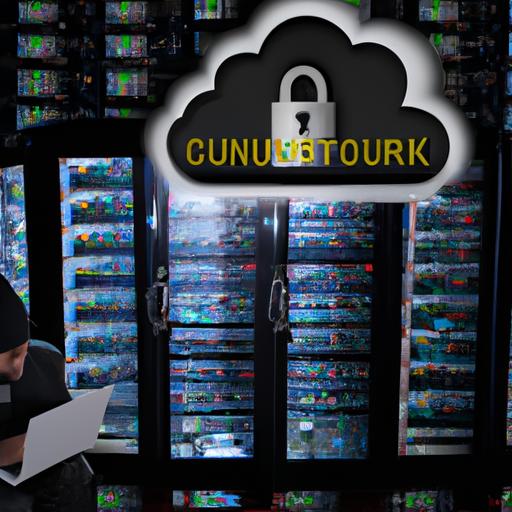Best Practices for Cloud Data Center Security

Hackers are constantly trying to find vulnerabilities in cloud data center security systems.
As more and more businesses move their data to the cloud, it’s essential to have a robust security plan to safeguard sensitive information. Here are some best practices for cloud data center security:
Importance of strong passwords and two-factor authentication
Passwords are the first line of defense against cyberattacks. To keep your data safe, it’s essential to use strong passwords that are challenging to guess. A strong password should be at least 12 characters long and include a mix of uppercase and lowercase letters, numbers, and symbols.
Two-factor authentication (2FA) adds an extra layer of security to your data by requiring an additional step to verify your identity. This can include a text message, email, or biometric verification.
Use of encryption in data transmission and storage
Encryption is a method of converting data into a code to prevent unauthorized access. It’s essential to encrypt your data both in transmission and storage to ensure it’s protected from cyber threats. This can include using Secure Sockets Layer (SSL) or Transport Layer Security (TLS) for data transmission, and Advanced Encryption Standard (AES) for data storage.
Regular security audits and updates
Regular security audits and updates are crucial to identifying and fixing vulnerabilities in your cloud data center security. This includes regular scans for malware and vulnerabilities, updating software and firmware, and reviewing access logs to ensure there are no unauthorized access attempts.
Employee training and awareness programs
Employees are the weakest link in any security system. To ensure your cloud data center is secure, it’s crucial to train your employees on best security practices and create awareness programs to keep them up-to-date on the latest threats and how to prevent them. This includes regular security training and phishing simulations to test their knowledge and awareness.
Compliance and Regulations for Cloud Data Center Security

Regular security audits are an important part of maintaining cloud data center security.
As cloud computing continues to gain more ground, the need for security and privacy has become even more crucial. The challenge of securing data on the cloud has led to the development of compliance standards and regulations aimed at protecting users’ data. In this section, we will dive into the regulations and compliance standards that companies must follow to ensure that their cloud data centers are secure.
Overview of Regulations and Compliance Standards for Cloud Data Center Security
There are various compliance standards and regulations that a company must follow to ensure that their cloud data centers are secure. These regulations are put in place to protect the privacy and security of users’ data. Some of the most commonly followed regulations and compliance standards include:
General Data Protection Regulation (GDPR)
GDPR is a regulation that was introduced in the European Union to protect the privacy of citizens’ data. The regulation applies to all companies that store, process, or transmit personal data of European Union citizens. Companies must follow strict guidelines on how they collect, store, and process data to ensure that it is secure.
Health Insurance Portability and Accountability Act (HIPAA)
HIPAA is a regulation that was introduced in the United States to protect the privacy of patients’ data. The regulation applies to all healthcare providers, insurance companies, and their business associates. Companies must follow strict guidelines on how they collect, store, and process data to ensure that it is secure.
Importance of Adhering to Regulations and Compliance Standards
Adhering to regulations and compliance standards is essential to ensure that a company’s cloud data center is secure. Failure to comply with these regulations can lead to legal and financial consequences, including fines, legal suits, and loss of reputation. Non-compliance can also lead to data breaches, which can be catastrophic for a company and its customers.
Consequences of Non-Compliance
Non-compliance can have severe consequences, ranging from legal and financial penalties to reputational damage. Companies that fail to comply with regulations and compliance standards can face the following consequences:
Legal and Financial Penalties
Companies that fail to comply with regulations and compliance standards can face legal and financial penalties. These penalties can be in the form of fines, legal suits, and loss of revenue.
Reputational Damage
Non-compliance can lead to reputational damage, which can be difficult to recover from. Customers may lose trust in a company that fails to protect their data, leading to a loss of business and revenue.
Cloud Data Center Security Tools and Technologies
Cloud data center security can be a daunting task, but fortunately, there are several tools and technologies available to ensure that your data is secure. In this section, we will provide an overview of some of the most commonly used security tools and technologies.
Overview of Security Tools and Technologies Available for Cloud Data Center Security
-
Intrusion Detection Systems (IDS) – IDS is a security system that monitors network traffic for signs of unauthorized access and alerts administrators in case of any suspicious activity.
-
Firewalls – Firewalls are designed to prevent unauthorized access to or from a private network. They can be hardware or software-based and work by analyzing incoming and outgoing traffic.
-
Virtual Private Networks (VPNs) – VPNs allow remote users to securely access a private network over the internet. They encrypt all data that passes through them and ensure that unauthorized users cannot access the network.
Importance of Choosing the Right Tools and Technologies
Choosing the right tools and technologies for cloud data center security is crucial. The wrong tools can leave your data vulnerable to attacks, while the right tools can protect your data and ensure its security.
When choosing security tools and technologies, it is important to consider factors such as the size of your organization, the amount of data you store, and the level of security you need. You should also consider the cost and the ease of use of the tools.
Examples of Security Tools and Technologies
-
Amazon Web Services (AWS) Security – AWS provides a range of security tools and services, including firewalls, IDS, and VPNs. They also offer encryption services to ensure that your data is secure.
-
Microsoft Azure Security – Microsoft Azure provides a range of security tools and services, including firewalls, IDS, and VPNs. They also offer encryption services and compliance certifications to ensure that your data is secure.
-
Google Cloud Security – Google Cloud provides a range of security tools and services, including firewalls, IDS, VPNs, and encryption services. They also offer compliance certifications to ensure that your data is secure.
In conclusion, choosing the right security tools and technologies is crucial to ensuring the security of your cloud data center. By using the right tools, you can protect your data from unauthorized access and ensure that your business operations run smoothly.
Conclusion
In conclusion, cloud data center security is a critical aspect that should be taken seriously by businesses and organizations that store sensitive data in the cloud. The risks associated with cloud data center security include various types of threats, including cyber attacks, data breaches, and hacking.
To mitigate these risks, businesses should implement best practices for cloud data center security, including strong passwords, two-factor authentication, encryption, regular security audits, and employee training programs. Compliance with regulations and standards for cloud data center security is also essential to avoid legal and financial consequences.
Fortunately, there are numerous security tools and technologies available to help businesses protect their cloud data centers from security breaches. By prioritizing cloud data center security, businesses can ensure the safety and integrity of their sensitive data in the cloud.
In conclusion, cloud data center security is not something to take lightly. It is essential to stay up-to-date with the latest security trends and technologies and to implement best practices to ensure the safety and security of your data. By investing in cloud data center security, businesses can protect themselves from the devastating consequences of security breaches and cyber attacks.